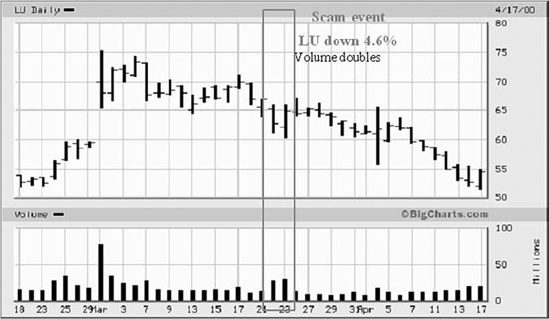11.9. It's Not Just Micro-Caps
Most of these examples involve thinly traded small-cap or micro-capitalization stocks. They are easier targets, but larger names are not immune from these shenanigans. In March 2000, a day trader posted a fake announcement regarding the earnings of Lucent Technologies:
MURRAY HILL, N.J., March 22 /PRNewswire/ — Lucent Technologies (NYSE: LU - news) said today that, based on preliminary estimates, it expects operating results for its second fiscal quarter of 2000 to be lower than analysts' estimates. The company expects to report revenues in the range of $9.4 to $9.5 billion for the quarter, which will end Mar. 31, 2000, flat with the prior year period.
Figure 11.5. Daily Prices and Volumes in Lucent Technologies, February 2000–April 2000. Even large-cap names are subject to Web manipulations. Reprinted with permission of BigCharts.com, © 1999 Dow Jones & Company, Inc. All Rights Reserved Worldwide.

The effect was dramatic. As seen in Figure 11.5, over $7 billion of market capitalization evaporated within a few hours, all driven by a dozen messages repeating the false rumor. It did not matter that the perpetrator was eventually caught; the damage was done.
Get Nerds on Wall Street: Math, Machines, and Wired Markets now with the O’Reilly learning platform.
O’Reilly members experience books, live events, courses curated by job role, and more from O’Reilly and nearly 200 top publishers.

